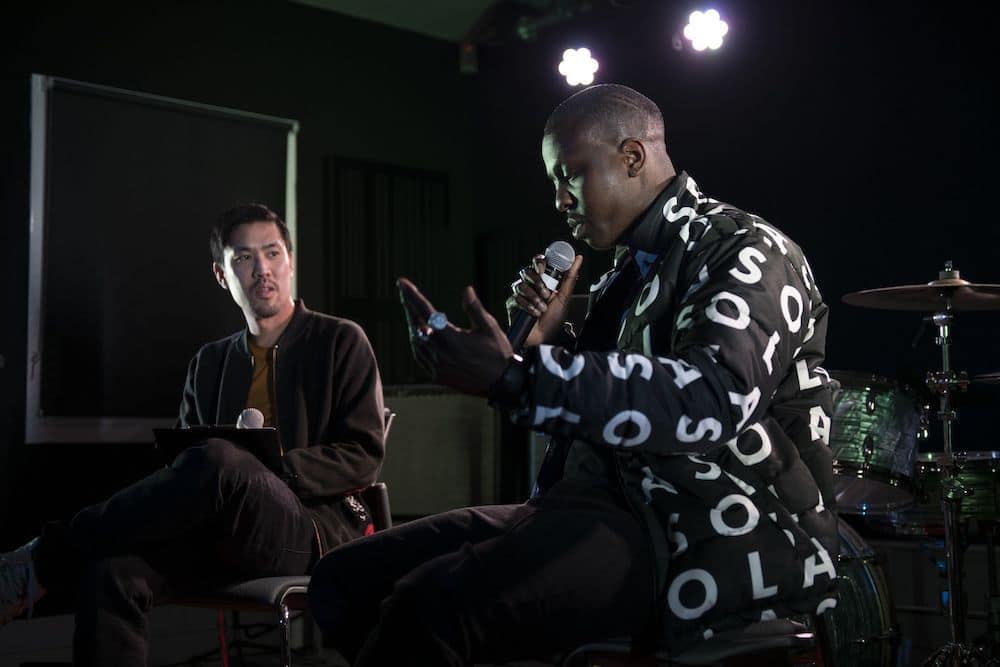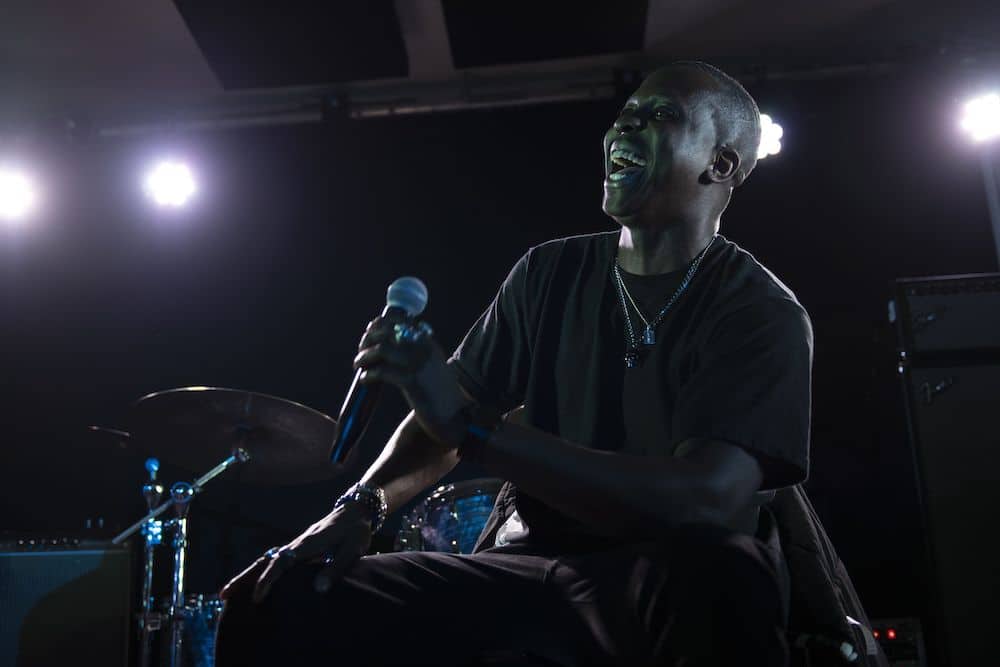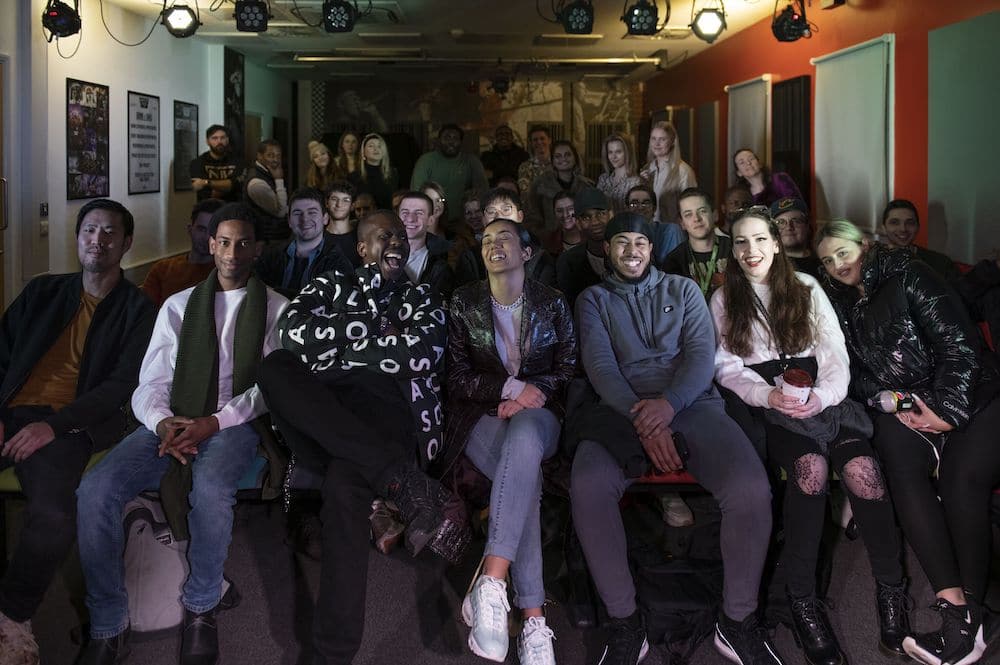What we learned from Jamal Edwards MBE
Jamal Edwards MBE – Entrepreneur, author and founder of online urban music platform SB.TV – recently paid a visit to BIMM London for an exclusive Masterclass. Music Journalism student Connor Winyard give his account of the insightful evening.
Jamal Edwards’ story is that of the underdog. SBTV, Edwards’ highly successful media platform, was founded in 2006, but it was tough. “I was filming people doing their thing on my old phone and the wind was louder than their voices,” he says before making a whooshing sound through the microphone. The audience laughs and he stops to reflect. “But before I knew it, SBTV had taken over my day job and I was able to quit.”
Not that Edwards was hesitant to move on; he didn’t get his steady Topman job conventionally. “I didn’t get an interview, so my Mum marched me back in there and said to the manager, ‘You better get my son a job.’ I ended up working there for four years.” He details a few anecdotes of his mother pushing him to earn a living, but is wary to paint her “in a mad way.”
Things started out small and inconsistent. “I love Steve Irwin, man; I used to film animals in my back garden.” It’s odd to think of SBTV, the place where British stars like Ed Sheeran, Nines and Jessie J were propelled to fame, has its roots in amateur home videos. Edwards doesn’t seem fussed. “It’s just about storytelling,” he says. “You don’t need hi-tech equipment; build up views from family and friends.”
Those close to him stood by when it was hard (“It took a lot of filming and no sleeping”) and eventually his manager became suspicious that people were coming into the store just to meet him. “What are you even doing in your spare time?” his boss queried. His YouTube payslip had matched his regular one. Edwards knew it was time to make SBTV his full-time project.
Dan Tsu, host and Music Business lecturer, remembers the key moment. “You flipped a switch, and SBTV claimed the power,” he says. “I just wanted to be the Banksy of digital content,” replies Edwards. “I initially wanted to be anonymous, and I was never afraid of doing videos with straight-up singers, or even people who can’t speak English.” Of course, Edward soon changed his mind and gradually allowed himself to become the face of independent UK music, so to speak.
Between questions, a large projector screen slowly scrolls down, showing everything from some of SBTV’s most classic videos to a new apprenticeship scheme involving young music industry hopefuls and South London grime star P Money. Edwards justifies some of the more commercial work he’s done. “I had companies like HSBC and Google contacting me to do collaborations. It was mad, but content on the Internet is there forever; I’d never do anything that isn’t 100 per cent authentic.”
The impending questions on Edwards’ tips and tricks arrive. Luckily for us, he sums up the six types of content for sharing:
- Comedic
- Scary
- Entertaining
- Inspiring
- Nostalgic
- Not covered by mainstream media
He is adamant these are the set content genres that will get a great viewership if you “always think of viral moments.” It is here that Edwards casually drops something that is sheer genius.
“I wanted to be the Banksy of digital content.”
– Jamal Edwards, MBE
A student in the audience mentions he is an upcoming artist and wants to know how he can stand out among the waves of talent. “Nowadays, anyone can be an artist; how do you stand out and not get lost in the noise?” he queries. “You gotta think about how things go viral. Like, for example, TikTok [social media platform] is getting big now,” he replies. And in a passing comment, he questions, “But what about when #WW3 was trending? Why didn’t you do a song about that?”
He is right, but it unveils something a little dystopian. Everything now – be it conflict, famine, unrest, politics, events – is just a meme, a trend, a fad for people to cash in on. And Edwards himself is a testament to that fact. “Your competition isn’t other people,” he says. “It’s your own procrastination. It’s clear that the only person able to make those steps, from cashing in on a viral trend, making something from nothing and changing their own future, is yourself.”
“How do you dump some ideas and latch on to others?” asks another student. Edwards reveals his methods. “I bounce ideas in WhatsApp groups,” he replies. “It stops my brain crashing. It also stops me doing things that might be damaging to my reputation. I might think of something amazing, but I put it in a chat and everyone’s like, ‘Nah Jamal, listen, that’s dead, don’t do that,’ and it makes me think. It’s better to get feedback there and then rather than publicly when you’ve already posted it and people support it just because it’s you.”
Through it all, everything comes back to Edwards’ honest approach and his journey in helping others. Aside from SBTV’s massive success in launching dozens of careers (including his own), the media mogul has also launched four youth centres to help young people find work and develop their careers. He’s humble about it, and he insists a key phrase, which resonates through both his philanthropy and his career, as well as tonight’s extraordinary discussion.
“No idea is original. Tweaking it is.”
– Jamal Edwards, MBE
Words by Connor Winyard




